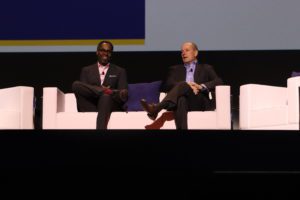Nolan Finley and Stephen Henderson: Anonymity, the ‘Me Factor’ Makes Society Less Civil
March 2, 2018 Society is becoming ruder, driven by widespread anonymity online and the belief that, “My opinion is more important than yours.” That was the overarching message from two of Detroit’s most respected journalists, Nolan Finley of The Detroit News, and Stephen Henderson of WDET 101.9 FM and Detroit Public Television.
Society is becoming ruder, driven by widespread anonymity online and the belief that, “My opinion is more important than yours.” That was the overarching message from two of Detroit’s most respected journalists, Nolan Finley of The Detroit News, and Stephen Henderson of WDET 101.9 FM and Detroit Public Television.
During the Conference session “What’s Driving Incivility? Traditional and Social Media’s Impact,” Finley and Henderson, who sit at opposite ends of the political spectrum, acknowledged that neither one has all the answers. However, in the age of 24-hour news cycles, the longtime friends said it is important to engage in active listening to better understand how someone else has formed an opinion.
“Today, people are more interested in talking over you or spewing the most vial of comments at you just because they don’t agree with you,” Finley said. “Listening is not something that is valued today. We feel like we are so righteous in our own opinions that we don’t want to hear any other opinions and we don’t want anyone else to hear other opinions.”
Following their remarks, Finley and Henderson were joined on stage by Mike Brownfield, director of communications for Goldwater Institute; Kerry Doman, founder and CEO for After 5 Detroit; LaRon Johnson, business leader for LinkedIn Detroit; and Debra Williams, executive vice president for Right Management; for a discussion on social media’s role in provoking incivility.
Key takeaways:
- Having a conversation with someone will help you understand how their background and life experiences have helped shape their opinions.
- The ease of anonymity on social media gives people a false sense of being a “superhero” and naturally creates incivility among online communities.
- Social media rewards incivility with “likes” and retweets, fueling the flames of heated debate and personal attacks.
- Society has changed and is more aggressively uncivil. More people are less willing to listen and more willing to push their opinion above others.
- The process of writing and mailing a letter to the editor used to “slow people down” and help them remember their manners. With the internet, the most vial comments are posted online with the push of a button.
- Incivility is situational. While outlandish comments are regularly embraced online, the same comments would not be tolerated in the workplace or in communities.
